Myanmar rebel group withdraws from key town on Thai border
An official of the Karen National Union says the "temporary retreat" from the town of Myawaddy comes after the return of junta soldiers to the vital strategic area.

Military personnel stand guard as hundreds of refugees crossed over the river frontier between Myanmar and Thailand following the fall of a strategic border town to rebels fighting Myanmar's military junta. / Photo: Reuters Archive
A Myanmar rebel group has withdrawn its troops from a town along the Thai border following a counteroffensive by soldiers of the ruling junta from whom the rebels had this month wrested the key trading post, an official said.
A spokesman for the Karen National Union (KNU) said on Wednesday that the "temporary retreat" from the town of Myawaddy came after the return of junta soldiers to the vital strategic area that is a conduit for annual foreign trade of more than $1 billion.
"KNLA troops will ... destroy the junta troops and their backup troops who marched to Myawaddy," Saw Taw Nee said, referring to the group's armed wing, the Karen National Liberation Army, one of Myanmar's oldest ethnic fighting forces.
Fighting had flared as recently as Saturday in Myawaddy, forcing 3,000 civilians to flee as rebels fought to flush out Myanmar junta troops holed up for days at a border bridge crossing.
Many of those civilians have since returned, the Thai government has said, adding that it had also urged Myanmar to keep the fighting from spilling across the border.

Unprecedented pressure
Photographs posted on some pro-junta social media groups showed a handful of soldiers raising the Myanmar flag at a military base the KNU had controlled just days before, and where the rebel group had raised its own banner.
The junta, which has mounted a counter-offensive to retake Myawaddy, was able to enter the area with the help of a regional militia that had stood aside when the KNU laid siege to Myawaddy early in April, according to Saw Taw Nee.
Officials from the militia group, the Karen National Army, and the junta did not respond to telephone to seek comment.
Three years after its coup ousted a democratically-elected civilian government, Myanmar's junta is under unprecedented pressure, having lost control of a string of key frontier areas to rebel groups.
Hundreds of civil war victims treated every day as Myanmar chaos spills over Thailand border
China, the US, and Thailand are reassessing their strategies. Whatever happens next, the future of Myanmar will probably remain splintered, with no one authority in charge.
Cordelia Lynch
Asia correspondent
China, the US, and Thailand are reassessing their strategies. Whatever happens next, the future of Myanmar will probably remain splintered, with no one authority in charge.
Cordelia Lynch
Asia correspondent
Sky News
Wednesday 24 April 2024
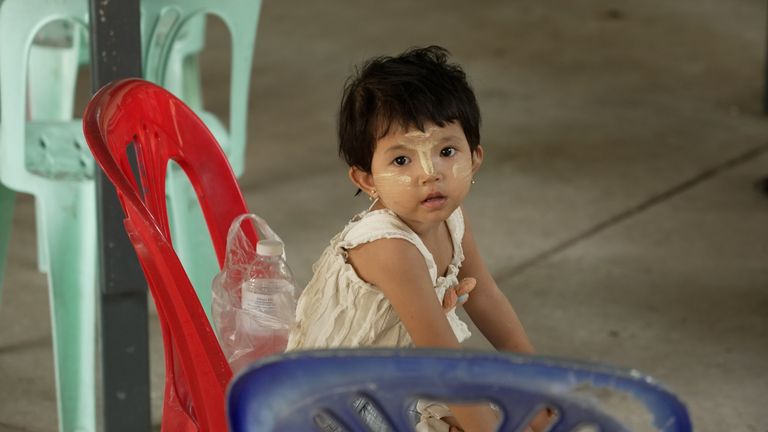
Mae Tao clinic in Mae Sot, a frontier town along the border with Myanmar, is a harrowing window into a civil war that has suddenly escalated.
In the searing heat of early morning, the wards are packed full of patients, some with catastrophic injuries.
We walk into a room full of amputees, many recently injured by airstrikes and landmines.
Lying on a bed with his stomach held together by a bandage, we meet Maung Maung.
His voice is incredibly strained, and he can hardly move. He's just lost his two daughters. One was two years old, the other 14.
"They were hiding in a school. I thought it would be safe. After the bomb, I saw the body of one of my daughters ripped apart," he tells us.
Many here say they're too terrified to return to their home country and that fighting is now a daily threat.
MORE ON MYANMAR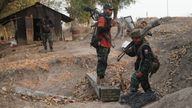
Resistance fighters claim they have taken key Myanmar border town from military

Aung San Suu Kyi's son receives handwritten letter from imprisoned former Myanmar leader after three years of silence
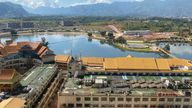
Rebels take key Myanmar city after government troops lay down weapons
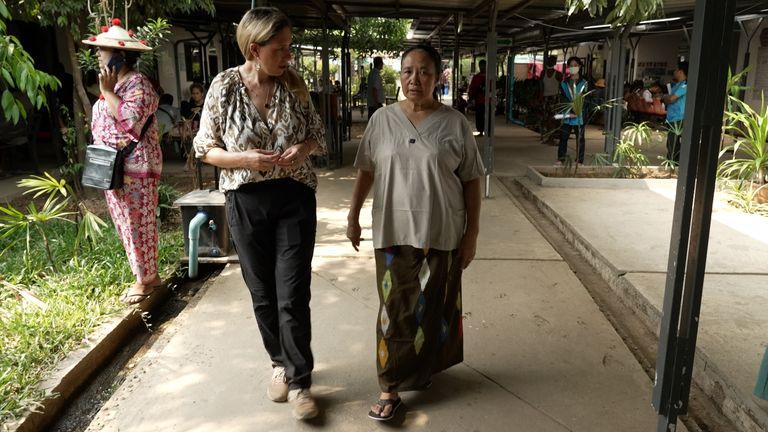
Wednesday 24 April 2024

Mae Tao clinic in Mae Sot, a frontier town along the border with Myanmar, is a harrowing window into a civil war that has suddenly escalated.
In the searing heat of early morning, the wards are packed full of patients, some with catastrophic injuries.
We walk into a room full of amputees, many recently injured by airstrikes and landmines.
Lying on a bed with his stomach held together by a bandage, we meet Maung Maung.
His voice is incredibly strained, and he can hardly move. He's just lost his two daughters. One was two years old, the other 14.
"They were hiding in a school. I thought it would be safe. After the bomb, I saw the body of one of my daughters ripped apart," he tells us.
Many here say they're too terrified to return to their home country and that fighting is now a daily threat.
MORE ON MYANMAR

Resistance fighters claim they have taken key Myanmar border town from military

Aung San Suu Kyi's son receives handwritten letter from imprisoned former Myanmar leader after three years of silence

Rebels take key Myanmar city after government troops lay down weapons

Cordelia Lynch and the clinic's founder Cynthia Maung (right)
For decades, Dr Cynthia Maung, founder of the clinic in Thailand, has seen the graphic side effects of the world's longest-running civil war, a brutal clash between Myanmar's military and a mix of pro-democracy groups and local ethnic rebel armies.
In recent weeks though, she says the number of patients coming to her almost doubled to 500 a day.
"This is the worst in my time in 35 years here. This is the worst situation," says Dr Maung.
As we talk, there are patients of all ages. She is their great hope, but she's juggling increasingly complex and desperate cases.
There's recently been a sharp increase in those coming here wounded by bombs.
The embattled ruling junta has increasingly been carrying out airstrikes in the face of big losses. The resistance now controls more than half of Myanmar's territory.
One of the most symbolic defeats came two weeks ago in Myawaddy. The small town has an outsized economic role, known as the so-called "gateway to Thailand".
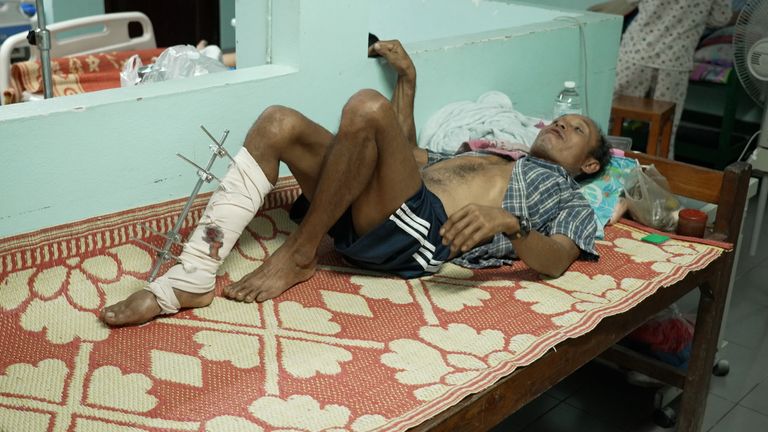
It has long been a focal point for many of the ethnic and pro-democracy groups, but rarely looked vulnerable.
Yet two weeks ago, rebel forces led by the Karen ethnic army made their move, stunning observers by taking the town.
Social media videos show the military seemingly launching an operation to retake it - but their convoy is ambushed, resistance fighters taking over their vehicles and sending them fleeing.
At the top of a hill on the Thai side of the border, the army is watching everything closely. There's a nervousness and tension that hasn't been there since the coup in 2021.
Read more:
Myanmar junta 'deliberately bombing medical facilities'
Myanmar's civil war has taken dramatic turn
Sub-Lieutenant Chuchat Farangtong tells me: "I felt the resistance groups were well prepared.
"There were signs before they attacked. My unit could see their manpower and their weapons. And there were civilians waiting along the river getting ready to cross over."
In the past few days alone, thousands have fled the fighting in Myanmar, many running away from conscription driven by a military desperately in need of more men.
Among them is 19-year-old Nyi Nyi, now in hiding in Thailand after secretly crossing the border - a terrifying journey that took three days.
"When I was fleeing, most of my friends got arrested by the military," he says.
"They were interrogated and tortured. They trained them for just three weeks and then sent them to the frontline."
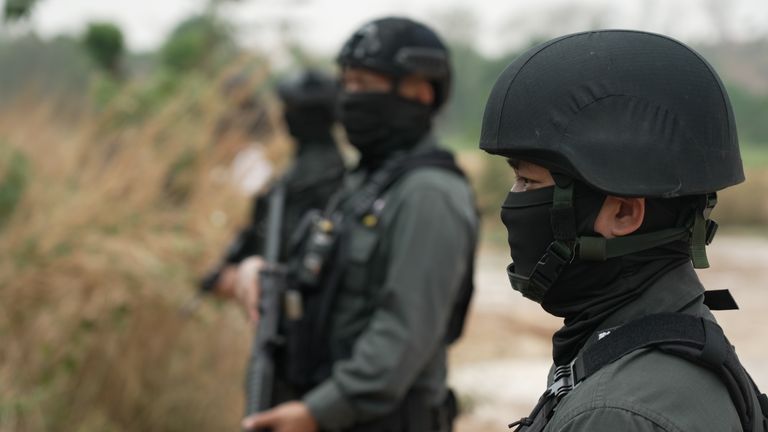
For decades, Dr Cynthia Maung, founder of the clinic in Thailand, has seen the graphic side effects of the world's longest-running civil war, a brutal clash between Myanmar's military and a mix of pro-democracy groups and local ethnic rebel armies.
In recent weeks though, she says the number of patients coming to her almost doubled to 500 a day.
"This is the worst in my time in 35 years here. This is the worst situation," says Dr Maung.
As we talk, there are patients of all ages. She is their great hope, but she's juggling increasingly complex and desperate cases.
There's recently been a sharp increase in those coming here wounded by bombs.
The embattled ruling junta has increasingly been carrying out airstrikes in the face of big losses. The resistance now controls more than half of Myanmar's territory.
One of the most symbolic defeats came two weeks ago in Myawaddy. The small town has an outsized economic role, known as the so-called "gateway to Thailand".

It has long been a focal point for many of the ethnic and pro-democracy groups, but rarely looked vulnerable.
Yet two weeks ago, rebel forces led by the Karen ethnic army made their move, stunning observers by taking the town.
Social media videos show the military seemingly launching an operation to retake it - but their convoy is ambushed, resistance fighters taking over their vehicles and sending them fleeing.
At the top of a hill on the Thai side of the border, the army is watching everything closely. There's a nervousness and tension that hasn't been there since the coup in 2021.
Read more:
Myanmar junta 'deliberately bombing medical facilities'
Myanmar's civil war has taken dramatic turn
Sub-Lieutenant Chuchat Farangtong tells me: "I felt the resistance groups were well prepared.
"There were signs before they attacked. My unit could see their manpower and their weapons. And there were civilians waiting along the river getting ready to cross over."
In the past few days alone, thousands have fled the fighting in Myanmar, many running away from conscription driven by a military desperately in need of more men.
Among them is 19-year-old Nyi Nyi, now in hiding in Thailand after secretly crossing the border - a terrifying journey that took three days.
"When I was fleeing, most of my friends got arrested by the military," he says.
"They were interrogated and tortured. They trained them for just three weeks and then sent them to the frontline."

Thai patrols are taking place on the border with Myanmar
He claims opponents are being brutally attacked by a military desperate to cling to power: "They starve opponents, put them in stress positions and beat them until they bleed from their ears."
We asked the ruling junta about his allegations. They did not respond to our request for comment.
Myanmar's military government has been losing ground in its borderlands for months, as pro-democracy militias and ethnic armed groups have launched a series of successful offensives.
That's been made possible by previously disparate groups coming together.
It is unlikely the ruling military government is at risk of being overthrown imminently, but we haven't seen a shift like this for years.
That's a challenge for neighbouring countries trying to navigate their relationship with Myanmar, the creeping violence on the border areas and the exodus of Myanmar's people.
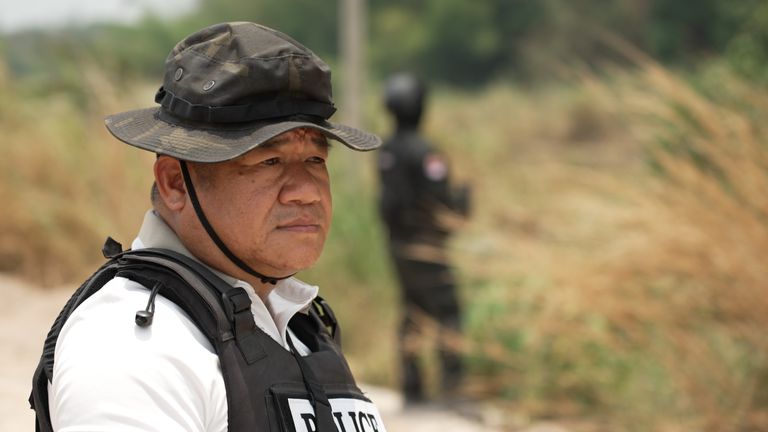
He claims opponents are being brutally attacked by a military desperate to cling to power: "They starve opponents, put them in stress positions and beat them until they bleed from their ears."
We asked the ruling junta about his allegations. They did not respond to our request for comment.
Myanmar's military government has been losing ground in its borderlands for months, as pro-democracy militias and ethnic armed groups have launched a series of successful offensives.
That's been made possible by previously disparate groups coming together.
It is unlikely the ruling military government is at risk of being overthrown imminently, but we haven't seen a shift like this for years.
That's a challenge for neighbouring countries trying to navigate their relationship with Myanmar, the creeping violence on the border areas and the exodus of Myanmar's people.

Lieutenant Sivadumrong; police seem to be trying to play the role of protector and enforcer
We went on patrol with the Thai police who seem to be trying to play the role of protector and enforcer, helping some find refuge and detaining others.
They tell us they've arrested up to 30 people trying to cross illegally into Thailand every day.
"I'm worried that the bullets are flying to the Thai side," Lieutenant Manop Sivadumrong says.
"So, we've deployed border police and provincial police along the border to prevent illegal migrants and to help the Myanmar people on both sides in case they are injured."
It is a delicate balance for them and many other countries - one by-product of a conflict many have ignored.
But the international community is slowly waking up.
China, the US, and Thailand are reassessing their strategies. Whatever happens next, the future of Myanmar will probably remain splintered, with no one authority in charge.
And a splintered state will likely reap havoc on innocent civilians and continue to spill across national borders.
We went on patrol with the Thai police who seem to be trying to play the role of protector and enforcer, helping some find refuge and detaining others.
They tell us they've arrested up to 30 people trying to cross illegally into Thailand every day.
"I'm worried that the bullets are flying to the Thai side," Lieutenant Manop Sivadumrong says.
"So, we've deployed border police and provincial police along the border to prevent illegal migrants and to help the Myanmar people on both sides in case they are injured."
It is a delicate balance for them and many other countries - one by-product of a conflict many have ignored.
But the international community is slowly waking up.
China, the US, and Thailand are reassessing their strategies. Whatever happens next, the future of Myanmar will probably remain splintered, with no one authority in charge.
And a splintered state will likely reap havoc on innocent civilians and continue to spill across national borders.
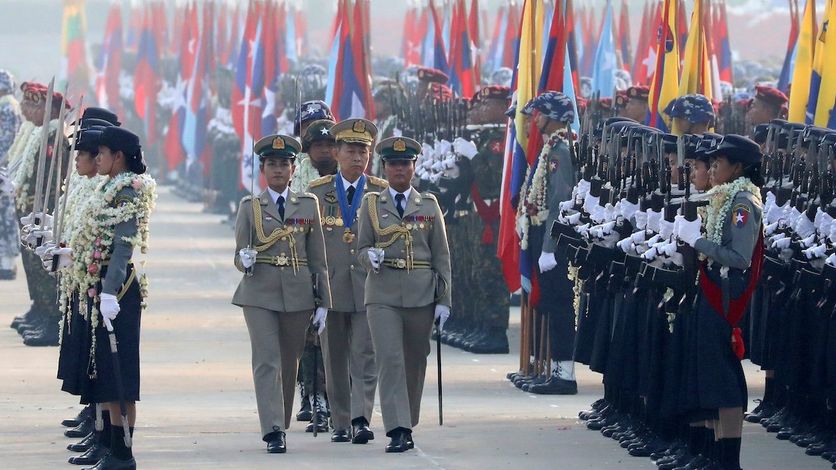
No comments:
Post a Comment